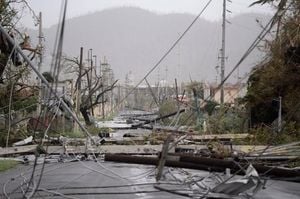When B., a 39-year-old asylum recipient from Cameroon, finally received his long-awaited approval to stay in the United States in late 2024, he thought the hardest part was behind him. Years of uncertainty, fear, and scraping by on odd jobs—cleaning homes, delivering food—had left him exhausted. But what really kept him afloat during those first fragile months was the Supplemental Nutrition Assistance Program (SNAP), better known as food stamps. "While not having income, it was very helpful," B. told Stateline. "I’m somebody who if I can work, I will work. The only reason I went over there to ask is because I had nowhere else to go."
That lifeline, however, has been abruptly cut for most refugees and asylees like B. This seismic change came with the One Big Beautiful Bill Act, the sweeping federal domestic policy package signed into law by President Donald Trump on July 4, 2025. The law, among other things, makes most refugees and asylees ineligible for SNAP—even though they entered the country legally. Only Cubans and Haitians, who might also be refugees or asylees, remain eligible under the new rules.
SNAP, a federally funded but state-administered program, has long provided crucial support for millions of low-income families and individuals. On average, it serves 42 million people each month. But now, as of August 2025, states like New York, Texas, Maryland, and California are bracing for the fallout as tens of thousands of noncitizen residents lose access to the program. New York estimates around 41,000 non-lawful permanent residents—including refugees and asylees—currently receive SNAP. In Texas, the figure is about 24,600. Maryland reported its SNAP program supported more than 10,000 refugees and asylees in 2024, while California projects 74,000 noncitizens—including lawful permanent residents, refugees, and asylees—will lose eligibility under the new law.
This comes at a time when the United States has seen a dramatic influx of people seeking safety. According to a November 2024 report from the U.S. Department of Homeland Security, 60,050 people were admitted as refugees in 2023, many fleeing instability in places like the Democratic Republic of Congo, Syria, and Afghanistan. Meanwhile, at least 747,000 people applied for asylum in 2023—a tenfold jump from the 68,000 applications received in 2013. By July 2025, more than 2.2 million immigrants were awaiting asylum hearings or decisions, according to the Transactional Records Access Clearinghouse at Syracuse University.
Supporters of the SNAP change argue that refugees and asylees, who can obtain work permits and have access to sponsoring organizations, should be able to achieve self-sufficiency more quickly. Jessica Vaughan, director of policy studies at the Center for Immigration Studies, told Stateline, "It’s not like they have been dropped off in this country with no support system. They have sponsoring organizations that are helping them get settled and they have work authorization. So they really should be moving forward towards self-sufficiency with support right out of the starting gate. And they should be moving ahead to obtain green cards." She pointed to a federal grant program that reimburses states and nonprofits for financial aid and healthcare provided to refugees.
But critics say the reality is far more complicated. Many asylees and refugees wait years for green cards, and community organizations that help them are already stretched thin. "SNAP is an incredibly fundamental program for this population that comes to the United States, really, with very little, if anything," said Nicolas Palazzo, policy counsel at HIAS, a global humanitarian and refugee advocacy group. He emphasized that SNAP is not a "handout," but a "smart and moral investment" that helps individuals become self-sufficient, protects communities, and strengthens the economy. "Stripping critical food assistance forces refugees and asylees into the shadows of informal work, labor exploitation and hunger that weakens our workforce and denigrates our moral obligations," Palazzo added.
State and local officials are also voicing concern. Barbara Guinn, commissioner of the New York State Office of Temporary and Disability Assistance, noted, "The concerning part there is that these are individuals who were … lawfully admitted to the country, have previously been eligible for SNAP when they need it, and now, simply because of their status, will no longer be able to receive SNAP benefits." She added, "There’s nothing we’re going to be able to do to make them eligible." While New York does offer some cash assistance through its Safety Net Assistance Program, recipients typically must be working—an impossible hurdle for many newly arrived or recently approved asylees.
Another major shift under the new law is that, starting in fiscal year 2028, states will have to cover between 5% and 15% of their SNAP costs. The exact percentage will depend on how accurately states dole out benefits to eligible people. Robert Rector, a senior research fellow at The Heritage Foundation, pointed out that states can continue to support refugees and asylees with SNAP-like benefits—if they’re willing to pay for it themselves. "If New York state doesn’t want to cut these people off, they can continue to give them something like food stamps. They just have to do it with New York state money right now," Rector said. But, as Guinn and others have noted, state budgets are already under strain, and food banks—often seen as a last resort—are stretched to the breaking point. Sherri Laigle, director of social services at HIAS, warned, "They’re already stretched, and now we’re going to see tens of thousands of people also needing to continue to rely on these programs. Of course, there’s limited access to them. You have to have transportation. You have to be able to get there."
For B., the policy change feels like a personal blow. "There are people who are in need. I think ignoring that—it’s not human," he said. Like many in his position, he would apply for food stamps again if he could, because his income is simply too low to get by. His story is a microcosm of a much larger challenge facing the U.S.: balancing the desire for self-sufficiency and fiscal responsibility with the moral and humanitarian obligations to those fleeing violence and persecution.
Meanwhile, the Trump administration’s broader immigration crackdown continues to draw scrutiny. Deportations to so-called third countries—nations other than an immigrant’s homeland—have increased sharply, with agreements signed with multiple countries in Latin America and Africa. The U.S. Supreme Court in June 2025 allowed swift removals to these third countries, sometimes with as little as six hours’ notice. The Department of Homeland Security says it seeks diplomatic assurances that deportees won’t face persecution or torture, but can proceed without them if the person is informed in a language they understand. Critics, including United Nations human rights experts, argue these policies risk stranding people in dangerous places and violate international protections for asylum seekers.
As the debate rages, the human stakes remain all too clear. For people like B., who fled for their lives and arrived with nothing, the loss of SNAP is more than a policy shift—it’s a question of survival in a new land where the promise of safety now comes with an asterisk.



